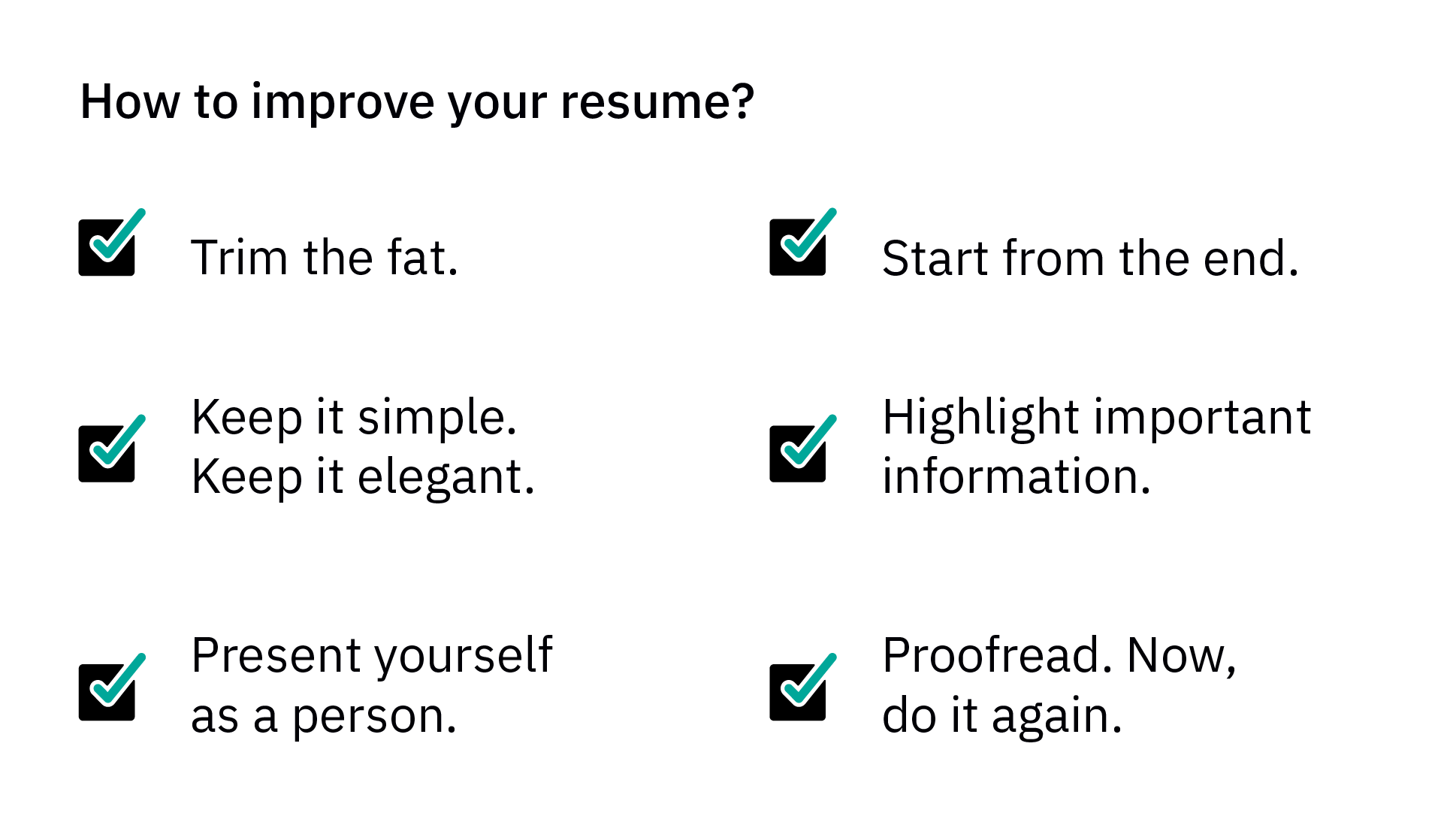
How to improve your resume: 6 steps to beef up your CV.
Updated on October 17, 2024
Do you want to get ahead in life? Of course you do! The best way to give yourself an edge is by having a great resume. A lot of people do not pay much attention when writing a resume. The feeling there is that the cover letter is the place for writing while your CV is there just to list data and facts, but a well-crafted resume will show employers that you are the perfect fit for the job, and help you stand out from everyone else.
Here we'll discuss why improving your resume is so important and how to improve your resume to make it shine brighter than all the rest. So let's get started on crafting a first-class CV that will open up doors of opportunity.
Why is a good resume so important?
It's quite simple: a great resume can open doors that were previously closed to you. It's your chance to stand out from the competition and prove why you're the perfect candidate for the job. Plus, with a well thought out and well made resume, employers are more likely to take notice and call you in for an interview - so don't underestimate its power.
With a top-notch resume, you'll be able to show off your skills and experience in the best possible light - making it easier than ever to land that dream job. So don't skimp on effort when creating a resume: take the time to make sure it's polished and professional, so you can really show potential employers what you have to offer. After all, having an outdated or lackluster resume won't do you any favors.
As the saying goes, you don’t get a second chance at a first impression so make sure yours is as good as can be.
How to improve your resume?
Now that we’re on the same page as to why a resume is important, it’s time to take a look at how to improve your CV. We’ll go over some general tips and advice in order to get you started and to give you an idea of what steps to take.
Trim the fat.
Write your resume without resorting to fluff. This means that you should focus on quality instead of quantity and list only those experiences that are relevant to the job. You don't need to include every summer job or volunteer experience you had in high school. Instead, highlight skills that are pertinent to the job and any accomplishments that you achieved along the way.
This also means to keep your resume concise — if it's longer than two pages, edit it down even if low on fluff. After all, employers won't spend lots of time reading through a long-winded document. They want to quickly understand who you are and what you bring to the table. Make sure your resume conveys that in as few words as possible.

Keep it simple. Keep it elegant.
When looking for a design for their resume, people tend to go overboard because they think that will get them stuck in the employers mind, and they’re right - but not in the way that they think. The most important aspect of a resume is that it is a fast way for your employer to learn about you. If your design is cluttered and busy then it takes away from the text itself and it shows poor decision making on your part.
That doesn’t mean that your resume needs to be boring and bland. An elegant color combo paired with a design that highlights and elevates the CV shows to your potential employer that you have a personality and restraint. Apart from that, it makes it easier on the eyes of the person who has to read all the resumes sent to them.
Present yourself as a person.
Instead of simply listing your skills and qualifications, talk about the unique experiences that make you who you are. Make sure to include hobbies, interests and any other activities or accomplishments outside of your job experience. Your resume should reflect more than just a professional background – let it represent the real you.
The reason why you should do this is because a lot of employers are looking for more than just someone who’s good at what they do, they are also looking for a culture fit in the team. Transcom places great emphasis on who our employees are as people, even to the extent of making it some of our core values. That’s because we know that bad team chemistry brings bad team results.
When it comes to composing your resume, think of yourself as a storyteller. You want to use language that is clear but also engaging. Don’t be afraid to show off your personality, you are more than just your work. But, through all of this, still keep in mind our first piece of advice about keeping it concise.
Start from the end.
When creating a chronology of your employment, try to organize it in such a way that the most recent experience is at the top. This might seem counterintuitive because we all like to start at the beginning in order to give a complete picture of our employment story, but employers are most interested in the last thing you did.
That doesn’t mean they won’t read the rest or that they won’t think of it chronologically. It just means that you need to put the most relevant and important information at the top to make the whole read easier.
Highlight important information.
We already talked about how readability is paramount in knowing how to improve your CV. That’s why you need to make sure that your resume stands out and that the most important information is clear and easy to find. This will not only give the reader an idea of what is important but also draw and guide their attention quickly and efficiently. This makes your resume easy to reread and to know or remember anything important about you at a glance.
To do this, you should consider highlighting key points or skills by bolding, underlining, or italicizing them. Apart from that, you can also have an “At a glance” section which saves the recruiters time and show that you know how to recognize what is important enough to highlight it.
Proofread. Now, do it again.
When you’re finished with writing your resume, please proofread it. There’s nothing that shows that you’re not the right candidate for the position, any position, like not taking a couple of minutes extra to proofread what you’ve written.
While a CV without errors might not get you extra points, one with errors will definitely net you negative ones. This automatically shows that you’re not detail oriented and that you allow oversights to happen in important matters. Our advice? Proofread it immediately and then do it again. A good way to make sure you’ve covered all bases is having someone else proofread your text or use one of the many proofreading tools available. Why? Because it’s easy to accidentally glance over mistakes in your own text while to others they will stick out like a sore thumb.
In conclusion.
This is by no means a definitive guide on how to improve your resume as these are just some of the ways you can beef it up. Companies and employers think highly of people who are detail-oriented and take time and effort to produce a polished CV. If you’re that kind of person, why not send us your resume? We would love to have you as part of the team.
